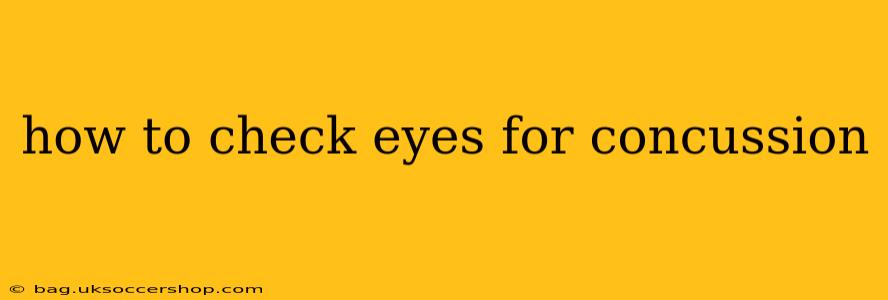A concussion, also known as a mild traumatic brain injury (mTBI), can cause a range of symptoms, some of which are subtle and easily missed. Eye-related symptoms are frequently associated with concussion, making a thorough eye examination a crucial part of the assessment process. While you should always seek medical attention from a qualified healthcare professional for suspected concussion, understanding some basic eye checks can help you identify potential issues and advocate for appropriate care. This guide will outline several key areas to observe, but it is not a substitute for professional medical evaluation.
What are the common eye symptoms of a concussion?
Concussions can disrupt the intricate neurological pathways controlling eye movement and vision. Some common eye symptoms include:
- Double vision (diplopia): Seeing two images of a single object.
- Blurred vision: Difficulty focusing or seeing clearly.
- Light sensitivity (photophobia): Increased sensitivity to light.
- Difficulty focusing: Trouble shifting focus between near and far objects.
- Eye strain or fatigue: Eyes feeling tired or strained, even with minimal use.
- Nystagmus: Involuntary rapid eye movements. This can be subtle and difficult to detect without training.
- Pupil dilation differences: One pupil may be larger than the other.
It's important to note that these symptoms can vary in severity and may not always be present. The absence of these symptoms does not rule out a concussion.
How to perform a basic eye exam after a head injury?
While not a substitute for professional medical assessment, you can perform some simple observations to help determine if a more thorough medical examination is warranted. These observations should be performed in a calm and quiet environment:
- Observe for pupillary response: Shine a light into each eye separately and observe if the pupils constrict equally and promptly. Unequal or sluggish pupil responses can be a sign of more serious neurological injury.
- Assess for double vision: Ask the person to look at your finger as you slowly move it from side to side and then up and down. Note if they report seeing double or appear to struggle following the movement.
- Check visual acuity: Ask the person to read something at a distance (e.g., a line of text on a wall chart) and up close. Note any difficulty or complaints of blurred vision.
- Observe for nystagmus: Note any involuntary jerking or shaking of the eyes. This is a more subtle observation and may be difficult to identify.
- Ask about light sensitivity: Inquire if the person experiences any increased sensitivity to light.
- Check for eye strain: Ask the person if their eyes feel tired or strained.
Remember, these are basic observations. Any concerning findings warrant immediate medical attention.
What tests do doctors use to check eyes for concussion?
Doctors use various tools and techniques to evaluate the eyes in the context of a concussion. These may include:
- Visual acuity tests: To measure sharpness of vision.
- Eye movement tests: To assess coordination and control of eye muscles.
- Pupil reflex tests: To evaluate the response of pupils to light.
- Visual field testing: To check the full extent of vision.
- Saccadic eye movement testing: To assess the speed and accuracy of rapid eye movements.
- Ophthalmoscopy: Examination of the inside of the eye using an ophthalmoscope.
Can eye problems indicate a serious concussion?
While most eye problems associated with concussions are temporary, they can sometimes indicate a more severe injury. Persistent or worsening eye symptoms, particularly double vision that doesn't improve, should be considered a warning sign. Immediate medical evaluation is critical in such cases.
What if I experience eye problems after a head injury?
If you experience any of the mentioned eye problems after a head injury, seek immediate medical attention. Do not attempt to self-diagnose or self-treat. A medical professional can properly assess the situation, order necessary tests, and provide appropriate treatment and management.
How long do eye problems from a concussion last?
The duration of eye problems following a concussion varies widely depending on the severity of the injury and individual factors. Some people experience complete resolution within days or weeks, while others may have lingering symptoms for several months or even longer. Consistent follow-up care with a medical professional is important to monitor progress and manage ongoing symptoms.
This information is for general knowledge and informational purposes only, and does not constitute medical advice. Always consult a healthcare professional for any health concerns or before making any decisions related to your health or treatment.
